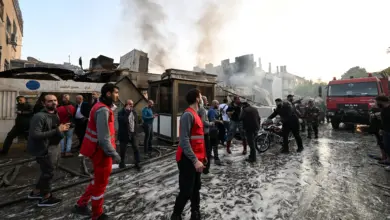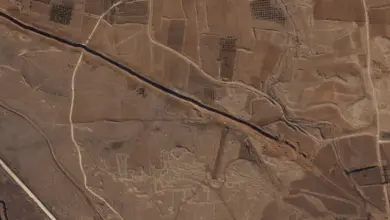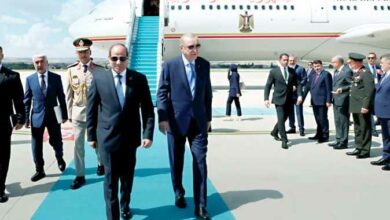Amman – Syrian troops and gunmen loyal to President Bashar al-Assad stormed a town near the Turkish border Saturday, burning houses and arresting dozens, witnesses said, in a persistent military campaign to crush popular revolt.
The latest assault followed another Friday of protests, which have grown in size and scope over the last three months, despite Assad's violent clampdown on public dissent. Activists said security forces shot dead 19 protesters Friday.
"They came at 7 am to Bdama. I counted nine tanks, 10 armored carriers, 20 jeeps and 10 buses. I saw shabbiha (pro-Assad gunmen) setting fire to two houses," said Saria Hammouda, a lawyer living in the border town in the Jisr al-Shughour region, where thousands of Syrians had fled to Turkey after the army clamped down on the area this month.
Bdama is one of the nerve centers providing food and supplies to several thousand other Syrians who have escaped the violence from frontier villages but chose to take shelter temporarily in fields on the Syrian side of the boundary.
"Bdama's residents don't dare take bread to the refugees and the refugees are fearful of arrests if they go into Bdama for food," Rami Abdulrahman of the Syrian Observatory for Human Rights told Reuters.
Another witness said government troops were also burning crops on nearby hillsides in an apparent scorched earth policy.
European powers initiated a detente with Assad before the unrest to try to draw the Syrian leader away from Iran and also stabilize Lebanon.
But they now say Damascus should face tougher sanctions over the violence against demonstrators seeking more political freedoms and an end to corruption and poverty.
Syrian rights groups say at least 1300 civilians have been killed and 10,000 people detained since March. One group has said more than 300 soldiers and police have also been killed.
"SECURITY GRIP IS WEAKENING"
Tens of thousands rallied across Syria Friday, defying Assad's repression and ignoring a pledge that his tycoon cousin Rami Makhlouf, a symbol of corruption among the elite, would renounce his business empire and channel his wealth to charity.
People rallied in the southern province of Deraa where the revolt began, in the Kurdish northeast, the province of Deir al-Zor near Iraq's Sunni heartland, the city of Hama north of Damascus, on the coast and in suburbs of the capital itself.
"The security grip is weakening because the protests are growing in numbers and spreading. More people are risking their lives to demonstrate. The Syrian people realize that this is an opportunity for liberty that comes once in hundreds of years," opposition figure Walid al-Bunni told Reuters from Damascus.
The Local Coordination Committees, a main activist group linked to protesters, said 10 demonstrators were killed on Friday in Homs, a merchant city of 1 million people in central Syria.
State television said a policeman was killed by gunmen.
One protester was also reported killed in the northern commercial hub of Aleppo, the first to die there in the unrest.
Thousands of people turned up to a funeral of a dead protester in Deir al-Zor, chanting anti-government slogans, Abdulrahman said.
The state news agency said nine people, including civilians and police, were killed in attacks by gunmen. Syria blames armed gangs and Islamists, backed by foreign powers, for the violence.
The Syrian government has barred most international journalists from the country, making it difficult to verify accounts from activists and officials.
Two towns on the main Damascus-Aleppo highway north of Homs were also encircled by troops and tanks, residents said, five days after the army retook Jisr al-Shughour, sending thousands fleeing across the border into Turkey.
Refugees from the northwestern region said troops and gunmen loyal to Assad known as "shabbiha" were pressing on with a scorched earthed campaign in the hill farm area by burning crops, ransacking houses and shooting randomly.
The International Federation for Human Rights and the US-based Damascus Center for Human Rights Studies said in a statement that, according to local sources, Syrian forces had killed more than 130 people and arrested over 2000 in Jisr al-Shughour and surrounding villages over the last few days.
The number of refugees who have crossed over into Turkey from Syria has reached 10,114, and another 10,000 were sheltering by the border just inside Syria, according to Turkish officials.
Journalists were given a brief tour of the Boynuyogun refugee camp in Hatay, where some 3500 people were living in 600 tents.
One refugee described how security forces clamped down on anti-Assad demonstrations.
"We wrote anti-regime slogans on the walls. Then the government reacted by erasing the slogans and they arrested the guy who tore down Assad's picture," said a 26-year-old man from Jisr al-Shughour who said his name was Mohammed.
Another refugee named Adam said security forces arrested people in the middle of the night a couple of weeks after the demonstrations.
"They came to my house…they started hitting me with the butts of their rifles on my back and head. They said "Is this the freedom you're asking for?'"
SECURITY COUNCIL DEADLOCK
Assad has responded to the unrest with a mix of military repression and political gestures aimed at placating protesters.
He has faced international condemnation over the bloodshed, and has seen the first signs of cracks in his security forces after a clash in Jisr al-
Shughour earlier this month in which the government said 120 security personnel were killed.
There have been no mass desertions from the military, but the loyalty of Sunni Muslim conscripts might waver if the crackdown on mainly Sunni protesters continues.
Assad's family and many military commanders are members of the Alawite sect, an offshoot of Shia Islam. In a spillover of the unrest into Lebanon, Sunni and Alawite gunmen clashed in the northern city of Tripoli and four people were killed.




